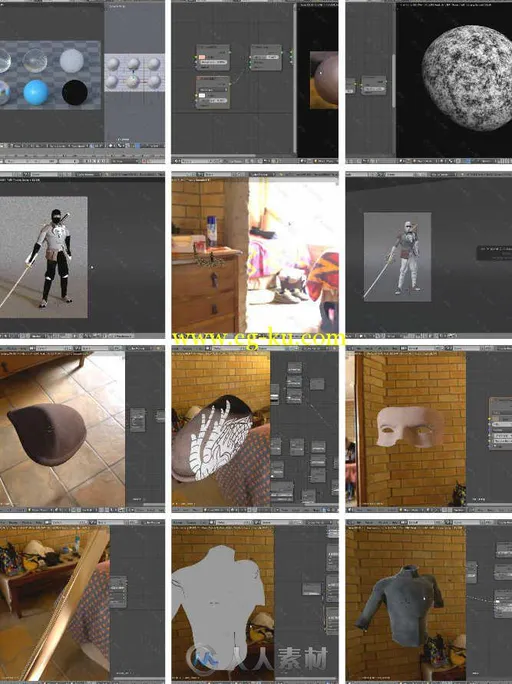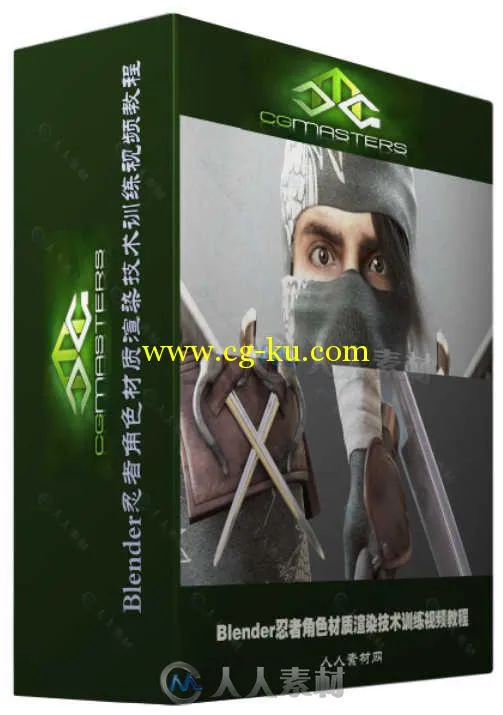本视频教程是由CGMasters机构出品的Blender忍者角色材质渲染技术训练视频教程,时长:2小时29分,大小:4.1 GB,MP4高清视频格式,附工程源文件,教程使用软件:Blender v2.7x,作者:Mark Masters,共16个章节,语言:英语。
Blender是一个开源的多平台轻量级全能三维动画制作软件,提供从建模,动画,材质,渲染,到音频处理,视频剪辑的一系列动画短片****制作解决方案。blender以python为内建脚本,支持yafaray渲染器,同时还内建游戏引擎。动画工具,包括了反向动作组件,可设定骨骼,结构变形,关键影格,时间线,非线性视频编辑,顶点量重及柔化动量组件,包括网孔碰撞侦察和一个具有侦察碰察的粒子系统,固体碰撞、布料、液体、力场解算。
CG Masters Character Creation Volume 3.5 Cycles Convert
In this condensed training DVD, Greg Zaal (taking the reins from Lee Salvemini’s finished Ninja character in Volume 3) shows you everything you need to know to create your own realistic and physically accurate Cycles materials.
Not only will you learn how to use the Cycles render engine, you’ll also learn the core principles of physically based shading. Using the ninja character as an example, we’ll go through all the various kinds of surfaces and study how and why they look the way they do, and then replicate that using node-based materials.
Cycles can often seem slower than traditional renderers, due to the fact that it’s a brute-force path tracer (meaning that instead of trying to fake or approximate light, it calculates it exactly as it behaves in reality), giving us the best possible image quality by default. For this reason, we’ll also cover several ways to optimize our scene and speed up the render without losing image quality.
This DVD is aimed at Blender users who have previous experience with the old Blender Render engine and would like to begin their adventures with the modern path tracer, Cycles. But if you’re new to materials and textures in general, don’t worry, all the basics are explained thoroughly.
Instructor: Greg Zaal
Video Info: 2hr 29min, 1920 x 1018 resolution, webm format.
Software Used: Blender 2.7x (Cycles)
Skill Level: Intermediate
DVD Features
Blend files included for every stage of the process, including most demonstrations
High resolution videos recorded at 100 DPI
Clean and simple web interface for watching the videos
A comprehensive help and info page including links to further reading.
Translates methods used for Blender Render to Cycles
Setting up reliable HDR lighting
Discover the possibilities of node-based materials
Conductive (metallic) vs. non-conductive materials
Optimizing thin glass and the cornea
Setting up reusable node groups
Destructive and non-destuctive render optimization
Using the Node Wrangler add-on
The difference between the glossy distribution functions and where you should use them
DVD Chapters
0. Introduction
1. Building a Basic Material
2. Texturing Overview
3.1. Lighting Setup
3.2. Fresnel
3.3. Subsurface Scattering
3.4. Metals
3.5. Clothing
4.1. Sai
4.2. Goggles
4.3. Eyes
4.4. Hair
5. Node Groups
6. Render Optimization


发布日期: 2016-4-14